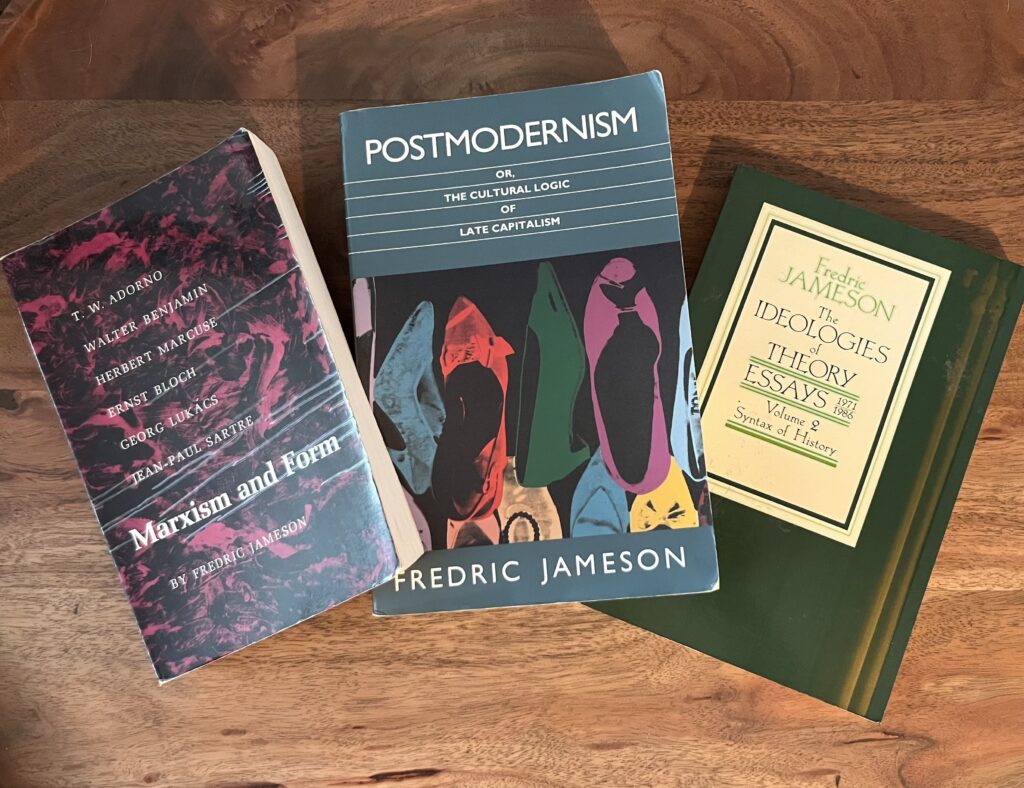The Marxist literary critic Fredric Jameson has passed away at the age of 90. Others who have engaged more deeply with his work and who knew him personally will doubtless have many more substantial memories to share and much keener insights to offer into his intellectual and cultural significance than I do. But his passing moves me to share some minor experiences of my own.
I first heard of Jameson as an undergraduate. As a philosophy major drawn to big ideas that were probably more advanced than my untutored mind was equipped to handle, I was fascinated by the concept of postmodernism. Its seemingly paradoxical name possessed an irresistible allure. How could something come after the modern, which to a callow youth like me simply meant “up to date”? When I learned that someone named Frederic Jameson had written a fat book with “Postmodernism” for its title—and with the equally vexing term “late capitalism” in its subtitle—I knew I had to get my hands on it. Unsurprisingly, when I did, I struggled to comprehend it, although I’d like to think that his famous description of the Bonaventure Hotel inched me closer to understanding what this curious “postmodernism” idea was all about.

Fast forward to my senior year of college, and I was writing an undergraduate thesis which argued that cognitive science-inspired philosophies of mind tended to naturalize capitalist subjectivity, another topic far too ambitious for a 21-year-old to be discussing intelligently. Somehow, I think while leafing through Jameson’s Archaeologies of the Future, I came across a footnote referencing an unpublished essay in which he interpreted Daniel Dennett’s Consciousness Explained as an allegory for capitalism. I knew immediately that I needed to read it, but how could I obtain a copy? Here my youthful naïveté proved helpful. I tracked down Jameson’s email address and wrote him a message, asking if he’d be kind enough to share his unpublished essay. To my surprise and delight, his assistant got back to me promptly, a copy of the essay attached as a Word document. I was thrilled to be able to quote it in my thesis, and I remain impressed that he, a renowned intellectual, was nice enough to share his unpublished writing with an unfamiliar undergraduate. Looking back, I doubt that my thesis was very well argued, but whatever insights it may have conveyed surely owe much to Jameson’s generosity.
As the years passed, I drifted away from the world of high theory with which Jameson’s work is often associated. I became more interested in the type of social and cultural history practiced by people like Raymond Williams and E.P. Thompson, whose hostility to “Theory” is encapsulated in the title of his polemic against Louis Althusser, The Poverty of Theory. I remain especially enamored of the political theorist Ellen Meiksins Wood, who didn’t mince words when it came to her opinion of postmodernism or jargon-heavy academic prose. These days, I am more drawn to analytic and Anglo-American philosophy, whose emphasis on clarity and rigor of argument I find challenging and admirable, than to the type of highfalutin theory I gravitated toward as an undergraduate. David Hume seems a more helpful guide to metaphysics than Martin Heidegger, and Noam Chomsky seems a more apposite commentator on politics than Michel Foucault. All this leaves me feeling rather distant from the continental philosophy-heavy intellectual climate of my college years and of Jameson.
Yet when I have engaged with Jameson’s work, I have found it insightful, perhaps in part because his stubborn attachment to Marxism keeps him grounded in ways that other capital-t Theorists often aren’t. Even when his sentences twist and turn maddeningly, they communicate ideas that possess solidity and significance. This was brought home to me recently while preparing a presentation for the American Comparative Literature Association conference in 2023. My theme was Shelley’s poetics and politics and their influence on subsequent radical thinkers in the historical materialist tradition, including Bertolt Brecht, Theodor Adorno, and Walter Benjamin. (Contrary to what my above remarks suggest, I have not left the orbit of theory entirely.) In need of a clear exposition of Brecht’s Verfremdungseffekt, I found my way to Jameson’s Brecht and Method, which offered just what I was looking for.

I’m not sure when I’ll have another occasion to engage with Jameson’s writings. He was a prolific and wide-ranging critic, so there’s a decent chance that I’ll be pulling one of his volumes off the shelf again sometime in the future. Perhaps Representing Capital, his reading of Marx’s magnum opus, will be next. But whatever it is, it will be proof that though his body has departed, his voice remains.
